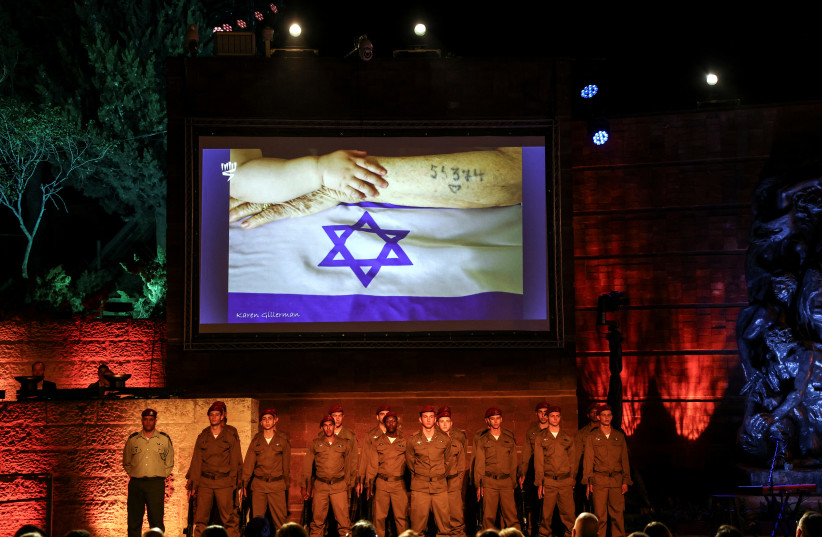I write on the occasion of Holocaust Remembrance Day – a poignant moment of remembrance and reminder – of bearing witness, of learning and acting upon the endearing and universal lessons of the Holocaust.
I write also as a member of the Coalition of Special Envoys to Combat Antisemitism, convening now in Jerusalem – and having just visited Yad Vashem – where we have borne witness to horrors too terrible to be believed, but not too terrible to have happened.
I write also amid the international drumbeat of evil, including the Russian crime of aggression, war crimes, and crimes against humanity against Ukraine; amid the ongoing mass atrocities targeting the Uighurs, Rohingya, Afghans and Africans; China’s multi-pronged assault on the rules-based order; the increasing imprisonment of human rights defenders and the culture of impunity accompanying it – the whole amid an ongoing international bystander community.
And I write also amid a global resurgence of antisemitic acts, assault and violence, where for example, the annual audit of antisemitism acts in Canada, just released by the League for Human Rights of B’nai B’rith, has reported the highest annual escalation in the last 40 years; where the annual audit of the Anti-Defamation League, also just released, has reported similar findings in the US, with both highlighting a dramatic increase in antisemitic violence; and where the North American experience is paralleled by similar findings in Europe.
And so, at this critical historical moment we must ask ourselves: What have we learned in the last 80 years – and more importantly, what must we do?

LESSON ONE: The danger of forgetting and the imperative of remembrance – le devoir de memoir
As we remember the victims of the Holocaust – defamed, demonized and dehumanized as prologue and justification for their killing – we must understand that the mass murder of six million Jews and millions of non-Jews is not a matter of abstract statistics.
As we say at these moments of remembrance, “Unto each person there is a name, each person has an identity, each person is a universe.” Thus, the abiding universal imperative: we are each, wherever we are, the guarantors of each other’s destiny.
<br>LESSON TWO: The danger of antisemitism – the oldest and most enduring of hatreds
Let there be no mistake about it: Jews were murdered at Auschwitz because of antisemitism, but antisemitism itself did not die at Auschwitz. It remains the bloody canary in the mineshaft of global evil today – toxic to democracies – an assault on our common humanity. And as we have learned only too painfully and too well, while it begins with Jews, it doesn’t end with Jews.
<br>LESSON THREE: The danger of Holocaust denial and distortion – an assault on memory and truth
It is our responsibility to unmask the bearers of false witness, to expose the criminality of the deniers, to combat the proliferation of Holocaust distortion – particularly in the social media – as we protect and ensure the dignity and memory of the victims.
Indeed, we have witnessed the weaponization of the COVID pandemic, where the Jews are blamed for manufacturing the virus, promoting its spread, and profiting from it, as we witness the weaponization of the “denazification libel” by the Russians in Ukraine.
<br>LESSON FOUR: The responsibility to pay tribute to the rescuers, the Righteous Among the Nations
Canada’s first honorary citizen, Swedish non-Jew Raoul Wallenberg, is here metaphor and message. For Wallenberg demonstrated how one person with the compassion to care, and the courage to act, can confront evil, prevail and transform history.
<br>LESSON FIVE: The danger of indifference and inaction in the face of mass atrocity and genocide.
In the face of such evil, indifference is acquiescence, if not complicity in evil itself. What makes the Holocaust, and mass atrocities in Rwanda, Darfur, and more recently of the Rohingya and the Uighurs, so unspeakable are not only the horror of the genocides – which are horrific enough – but that these genocides were preventable.
Nobody can say we did not know. We knew but we did not act. The international community cannot be bystanders to such horror – we must act.
<br>LESSON SIX: The dangers of impunity.
If the 20th century, and the first two decades of the 21st century, are the age of atrocity, they are also the age of impunity.
Few of the perpetrators have been brought to justice. It is our responsibility, therefore, to ensure that these hostis humanis generis – enemies of humankind – are brought to justice. For it is the culture of impunity which found expression in the inaction following Russia’s invasion of Georgia, seizure of Crimea, and indiscriminate bombing in Syria that incentivized the mass atrocities now happening in Ukraine.
It is these lessons that underpin my work as Canada’s inaugural special envoy on preserving Holocaust remembrance and combating antisemitism, as part of the larger struggle for the promotion and protection of human rights and human dignity in our time.
May today be not only be a day of remembrance, but a remembrance to act on behalf of our common humanity.
The writer is international chair of the Raoul Wallenberg Centre for Human Rights and former minister of justice and attorney-general of Canada.
